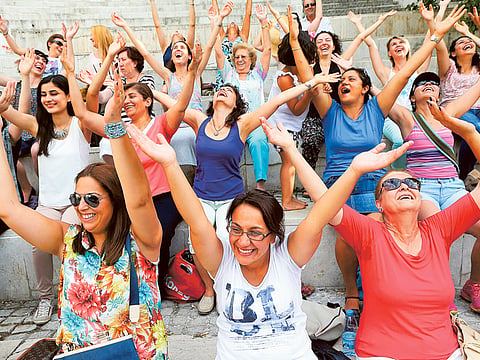Saudi survey: ‘Flirtatious’ women to blame for sexual harassment
Feminist advocates dismiss judgments as age-old reactions

Jeddah: It seems in male-dominated Muslim countries, women may not be entitled to mirth.
First, a top Turkish official last month reproached women for laughing in public, deeming such expressions immodest and a sign of the country’s moral erosion.
Now a Saudi social research centre reports that 80 per cent of people questioned in a national survey blame the scourge of sexual harassment plaguing the country on the “deliberate flirtatious behaviour” of women.
Feminist advocates in both countries dismissed the judgments as age-old reactions to changing social behaviour and a tendency in conservative cultures to accuse the victim of provoking her mistreatment.
In Turkey, Deputy Prime Minister Bulent Arinc spurred scorn and mockery when he described the ideal woman as one who “will not laugh in front of everyone and she will not display her attractiveness.”
Hundreds of Turkish women flocked to the internet to post pictures and videos of themselves grinning and guffawing in defiance of Arinc’s admonitions in a speech marking the end of Ramadan.
The sexual harassment survey in Saudi Arabia by the King Abdul Aziz Centre for National Dialogue in Riyadh stirred a more muted reaction in the kingdom, where women remain more socially marginalised than in purportedly secular Turkey.
“This report reflects an ongoing cycle within our community that blames any negative connotation within our society on the weakness of one’s religious beliefs, and on women,” activist Yara Wazir told Al Arabiya news agency.
“Our society is not built on mutual respect or accepting differences,” she said, “even when it comes to something as God-given as gender.”
Yara attributed the tendency to accuse women of inviting harassment to a lack of exposure to the opposite sex, which “encourages overanalsing of simple actions such as a smile, suggesting that is flirtation,” she told the news agency.
Muna Abu Sulaiman, a prominent media personality in the Arab world, called the survey results indicative of a conservative society’s difficulty in adjusting to “the novelty of a mixed-gender work environment.”
Only about 16 per cent of Saudi women are employed, and most of them work in segregated offices to prevent their interaction with men to whom they are not related. But as the leadership seeks to diversify the economy from its heavy dependence on oil trade, more women are being drawn into the workforce and in some cases working alongside unrelated men.
Saudi women aren’t allowed to drive, and in most regions are discouraged from appearing in public without a male relative or the abaya, hijab and niqab. Women were granted the right to vote and run for local office only three years ago — freedoms they will be able to exercise in elections next year.
The World Economic Forum global gender gap map places the kingdom 131st out of 134 countries evaluated for gender equality — Turkey ranked 124th — and said it was the only country to score zero on the Davos forum’s measure of women’s political empowerment.
— Los Angeles Times
Sign up for the Daily Briefing
Get the latest news and updates straight to your inbox



